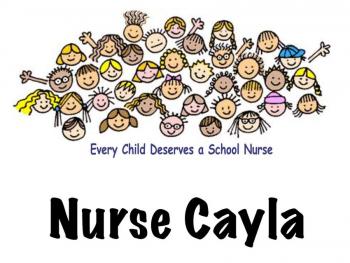School Nurse
Cayla Blasingame, BSN, RN

Welcome to the School Nurse Page!! Let me introduce myself. I am Cayla Blasingame, the Vega ISD School Nurse. I am a Registered Nurse, and I graduated from West Texas A&M University in 1997 with a BSN degree. I grew up in Vega, graduated from Vega High School, and continue to live here now with my husband. Our 3 boys also grew up in Vega and graduated from Vega High School. I have worked at Vega ISD as the school nurse since 2002, and currently work here full-time. I am proud and honored to get to work here everyday.
Cayla Blasingame, BSN, RN
Office Located on the Junior High Campus
Phone: 806-267-2123, extension 4
cblasingame@vegalonghorn.net
Important Links:
Please click the button LINK labeled "Seizure Management & Treatment Form" to be taken directly to the form required by TEA per Senate Bill (SB) 1506, 88th Legislature, 2023.
Any newly diagnosed student with seizures, change in medication, or changes to the students existing forms for the remainder of the 2023- 2024 school year, need to be filled out by the physician using this form. Starting 2024-2025 school year, all Texas schools are required to use this form. Senate Bill (SB) 1506, 88th Texas Legislature, 2023, amended Texas Education Code (TEC) §38.032 requiring TEA to adopt and post a form on the agency’s website to be used in submitting a seizure management and treatment plan to a student’s school that includes a specific list of information and the signatures of the student’s parent or guardian and the physician responsible for the seizure treatment.
This change in law applies to a seizure management and treatment plan submitted to a school district or open-enrollment charter school on or after January 1, 2024.
Infection Control Plan
The health and safety of our students, staff, and families is our top priority. Our infection control plan outlines proactive steps we take to minimize the spread of illnesses in our schools while promoting a healthy learning environment.
✅ Key Goals of Our Infection Control Plan
Prevent the spread of communicable diseases on campus
Educate students, staff, and families about proper hygiene practices
Maintain a clean and safe school environment
Collaborate with local and state health authorities
Respond promptly and effectively to any outbreaks
🏫 Daily Prevention Measures in Schools
We implement the following practices across all campuses:
Handwashing & Hand Sanitizer Access: Students are encouraged to wash hands regularly. Hand sanitizer is available in classrooms and common areas.
Cleaning & Disinfection: High-touch surfaces are cleaned frequently using EPA-approved disinfectants.
Health Screenings: Staff and parents are asked to monitor for symptoms of illness daily.
Stay Home When Sick Policy: Students and staff must stay home if they show symptoms of contagious illness (fever, vomiting, diarrhea, etc.).
Respiratory Etiquette: Cover coughs and sneezes with a tissue or elbow, followed by hand hygiene.
🤒 Student or Staff Illness
All students and staff should stay home when ill. Individuals who come to school or work with symptoms of illness, especially fever, will be sent home. Please use the following guidelines to help aid your decision of when to stay home or keep your child home.
When to Keep Your Child Home
To prevent the spread of infections, please keep your child home if they have:
Signs of severe illness- including fever, irritability, difficulty breathing, or extreme sleepiness.
A fever of 100.0°F or higher (must be fever-free for 24 hours without medication)
Vomiting or diarrhea (2 episodes) within the last 24 hours -the student should be both eating and drinking well for 1-2 meals without vomiting before returning to school.
Diarrhea that causes “accidents” or is bloody.
Persistent cough or difficulty breathing.
Rash of unknown origin, especially with a fever.
Conjunctivitis (pink eye) or other eye infection.
Diagnosed contagious illness (e.g., flu, strep throat, chickenpox).
Skin sores that are draining fluid on an uncovered part of the body and are unable to be covered with a bandage.
Known communicable disease must be treated for the appropriate amount of time as directed by a Dr before returning to school - Dr note required for return to school (see communicable disease chart or contact the school nurse for questions).
When recommended by a physician or school nurse.
See: Texas DSHS School Exclusion Criteria Texas DSHS Communicable Disease Chart LINK
Common Communicable Diseases in Schools
If an outbreak is detected, parents will be notified, and extra precautions will be taken per Texas DSHS and/or CDC guidelines.
Learn more at: CDC School Health & Disease Prevention
💉 Immunization Compliance
All students must be up to date with required immunizations to attend school, per Texas law. Records are reviewed annually.
More info: Texas DSHS Immunization Requirements for School Attendance
📢 Reporting & Communication
Monitor illness trends on campus
Notify parents of reportable conditions
Coordinate with local health departments during outbreaks
We encourage parents to report confirmed diagnoses of contagious illnesses to the campus nurse at 806-267-2123, ext. 4 or cblasingame@vegalonghorn.net
